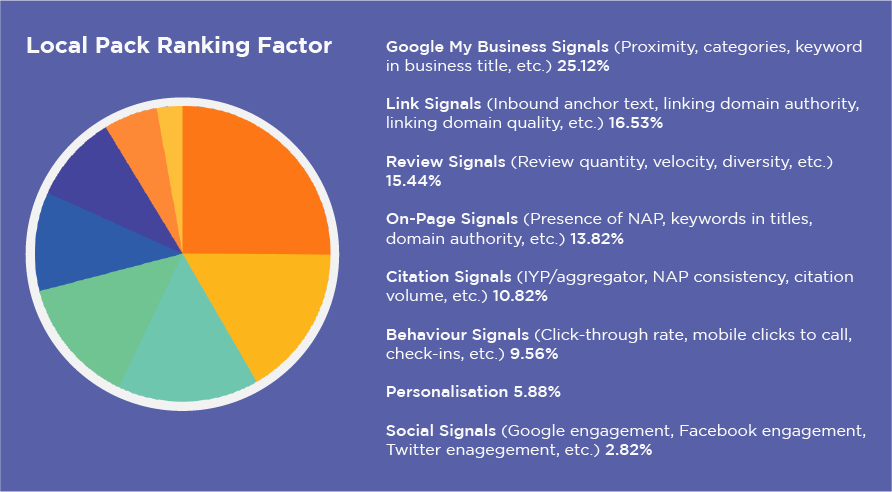Some law firms ask their happy clients to leave positive reviews on their Google profiles. Some law firms don’t.
Is it actually worth it? Can local reviews help you achieve more than just build trust among your prospective clients?
In this blog, we will look at the impact of reviews on law firms’ local SEO efforts; whether they can boost your local Google rankings and help you get more clients.
How do Google Reviews impact local Law Firm search rank?
Word-of-mouth marketing is very powerful. People rely on other people’s recommendations to validate their purchase decisions. And Google, of course, knows this.
For this reason, Google factors in the quantity and quality of your law firm’s reviews to evaluate the search position.
This is not surprising as users and search engines generally have a similar objective – to get the right information, service or product in the fastest way possible.
So why do reviews matter? They are a lot like personal recommendations.
When you enter a local search term into Google search or maps, such as ‘solicitors in Leeds’, 3 main factors will affect the ranking of each website displayed:
- Relevance
- Distance
- and Prominence
The first two ranking factors are self-explanatory; Google will attempt to present Law firms that are within your immediate vicinity.
Reviews fall into the ‘prominence’ category – how well known your law firm is.
A law firm with over a hundred reviews may outrank a closer local competitor if they have fewer, less positive ratings and reviews.
So, the more reviews and positive ratings, the better your law firm’s local ranking.
Below, we dive deeper into how reviews are a critical component of your law firm’s SEO performance.
How do we know online Google reviews help law firm search rankings?
Moz, one of the most popular and trusted SEO tools, determined that review signals (quantity, diversity and velocity) account for as much as 15% of local pack/ finder ranking.
- Review quantity is the total number of reviews currently posted to your Google My Business.
- Their diversity, on the other hand, is the number of reviews on multiple, high-authority review platforms.
- Review velocity is the frequency with which you received new reviews in a confined time period.
Out of the 8 known ranking factors highlighted by Moz, you can see that reviews are ranked 3rd, only 1% behind link signals. Reviews’ impact is rapidly on the rise.
So the conclusion is that Google review management strategy should be prioritised by your business more than ever before.
Again, Google is attempting to do the same things that searchers are doing – find the right product or service, or information in a timely manner. And client reviews help search engines achieve this in a couple of ways.
- They provide a high volume of current information about your law firm. They are a great alternative to content marketing (as they are free – your clients write them for you) and high-value user-generated content.
- Reviews serve to separate the good from the bad helping consumers find the best local business for their needs and avoid the worst.
Much of the ranking determination is done by automated search engine algorithms. One of their goals is to measure what is called the EAT – Expertise, Authority, and Trust. Google reviews play a vital role in measuring the ’T’.
The way it works is simple – great reviews from real-life local clients signal to Google that your business has the trustworthiness the algorithm is looking for.
Do Google Reviews Help your law firm’s SEO efforts?
Whether your online reviewers are singing your praises or venting about a bad experience, they are valuable.
Reviews are not only about helping build trust among your past and prospective clients but responding to reviews does more than build trust with your audience: it builds trust with Google, too.
Your responses to reviews send signals to Google that your business is actively responding to customers. This is great for your SEO strategy and search ranking.
Google itself admits that responding to reviews helps your SEO.
It favours it when you interact positively with your customers, and rewards your business with visibility.
Moreover, if a client’s review on your Google My Business listing contains keywords you are trying to rank for, for instance ‘Solicitor in Leeds’, you are more likely to rank for those keywords.
But do keep in mind that you can’t tell your clients what to write in their reviews. They must be honest and clients must write them their own words as it’s against the Google’s guidelines (and other review site’s).
Will adding reviews to your law firm website help improve the SEO?
As you collect more and more positive reviews about your law firm, you can get the most out of them by adding them to your website’s homepage.
This doesn’t particularly benefit (or harm) your on-page SEO but it’s great for UX (user experience). UX has become very important for Google in 2021.
Prospects also like to see 5-star reviews. So who knows – it may get you an extra client or two.
How to Get More Google Reviews of your law firm?
Wondering how to get more reviews? Ask for them.
Don’t be afraid to reach out to your recent and past clients. Many businesses leave out place cards or send emails requesting feedback, including links to their review page.
Bear in mind though, to never pay anyone for Google reviews and this includes marketers. This violates Google’s guidelines and their algorithms are designed to ‘sniff out’ fake reviews.
If Google has any suspicions that you or your employees have been creating false reviews about your law firm, your website could wind up with a stiff SEO penalty that would tank your rankings.
How to Handle Positive and Negative Google Reviews?
The general advice is that you should respond to all reviews, whether negative or positive.
By replying to positive reviews, you engage with happy customers and keep the conversation going after the sale of your legal service. This will leave a good impression on them, leading to a higher possibility of them returning to you in future.
If you get a negative client review, respond in a polite manner.
Sadly, many business owners respond to negative reviews with angry, not-so-professional, passive-aggressive responses. But don’t be that person.
Instead, take it as an opportunity to improve your brand and customer service. Research shows that customers are 1.7x more likely to visit your business if your company responds to negative reviews. So getting a bad review is definitely not the end of the world.
In your response:
- Thank them for their review while remaining professional and courteous,
- Apologise when appropriate (but don’t take responsibility for things that were not your fault),
- Show empathy and understanding,
- Offer to talk it over,
- Show them that you are authentic and genuine.
Your prospective clients will see this as a sign of professionalism.
Do Negative Reviews Hurt SEO?
Unfortunately, yes. They do. But not massively.
If you are following best practices and benchmarking at under 15% negative reviews, you have little reason to worry about your law firm’s online reputation.
In moderation, negative reviews are considered helpful. They can increase your credibility and present your firm as genuine.
Sometimes, a business with only positive reviews (especially if the reviews sound oddly similar) may appear suspicious to prospective clients.
Summary & Final Thoughts
To wrap this up, Google reviews affect your SEO, so do what you can to collect and highlight positive reviews. Make the most of negative ones and use your Google My Business to its full potential.
If you want to boost your overall SEO strategy, get in touch with us to see how we can help!

